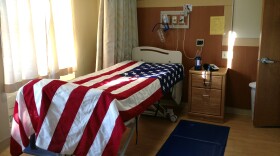
Quil Lawrence
Quil Lawrence is a New York-based correspondent for NPR News, covering veterans' issues nationwide. He won a Robert F. Kennedy Award for his coverage of American veterans and a Gracie Award for coverage of female combat veterans. In 2019 Iraq and Afghanistan Veterans of America honored Quil with its IAVA Salutes Award for Leadership in Journalism.
Lawrence started his career in radio by interviewing con men in Tangier, Morocco. He then moved to Bogota, Colombia, and covered Latin America for NPR, the BBC, and The LA Times.
In the Spring of 2000, a Pew Fellowship sponsored his first trips to Iraq — that reporting experience eventually built the foundation for his first book, Invisible Nation: How the Kurds' Quest for Statehood is Shaping Iraq and the Middle East (Bloomsbury, 2009).
Lawrence has reported from throughout the Arab world and from Sudan, Cuba, Pakistan, Israel, Gaza, and the West Bank. He covered Iraq and Afghanistan for twelve years, serving as NPR's Bureau Chief in Baghdad and Kabul. He covered the fall of the Taliban in 2001, the invasion of Iraq in 2003, the second battle of Fallujah in 2004, as well as politics, culture, and war in both countries.
In 2012, Lawrence returned to the U.S. to cover the millions of men and women who have served at war, both recently and in past generations. NPR is possibly unique among major news organizations in dedicating a full-time correspondent to veterans and the Department of Veterans Affairs.
A native of Maine, Lawrence studied history at Brandeis University, with concentrations in the Middle East and Latin America. He is fluent in Spanish and conversant in Arabic.
-
Thousands of Iraqis and Afghans have been resettled in the U.S. through a special visa program, but hundreds of cases are on hold.
-
Many veterans who served in World War II and the Korean War are now finding themselves needing end-of-life care. These vets are served by hospice care facilities across the country. But caring for vets isn't always the same as caring for others: as veterans approach the end of life, old traumas can resurface or appear for the first time.
-
As the generation that served in World War II and Korea grows older, the demand on the Department of Veterans Affairs for end-of-life care is growing with them. Now, the VA is trying new ways to help.
-
A 66-year-old Vietnam vet is due to be executed next week for the 1998 murder of a deputy sheriff in Georgia. There's no question that he shot the officer thanks to a grisly dashcam video. But the man's lawyers say PTSD and mental illness were not taken into consideration at sentencing.
-
The U.S. military set up a bank to collect brain tissue samples to better understand battlefield brain injury. But a law that prevents tissue donations from U.S. troops has severely hampered efforts.
-
A vocal critic of the Iraq war and the Bush administration has died. In 2004, Army veteran Tomas Young deployed to Baghdad, where a bullet left him paralyzed. Young passed away at his home in Seattle.
-
A new multimedia stage production, led by a Juilliard composer and an Iraq veteran who took up acting, hopes to help struggling soldiers battle post-traumatic stress disorder.
-
Veterans in some rural areas have to travel hundreds of miles on empty interstates to get health care, losing a day of work or sometimes two. A new program lets them see nearby doctors instead.
-
Overall, there are fewer homeless veterans these days. But that good news is tempered by the growing number of homeless vets with families, including many women.
-
President Obama addressed the annual convention of the American Legion in North Carolina with a raft of new proposals for vets.




